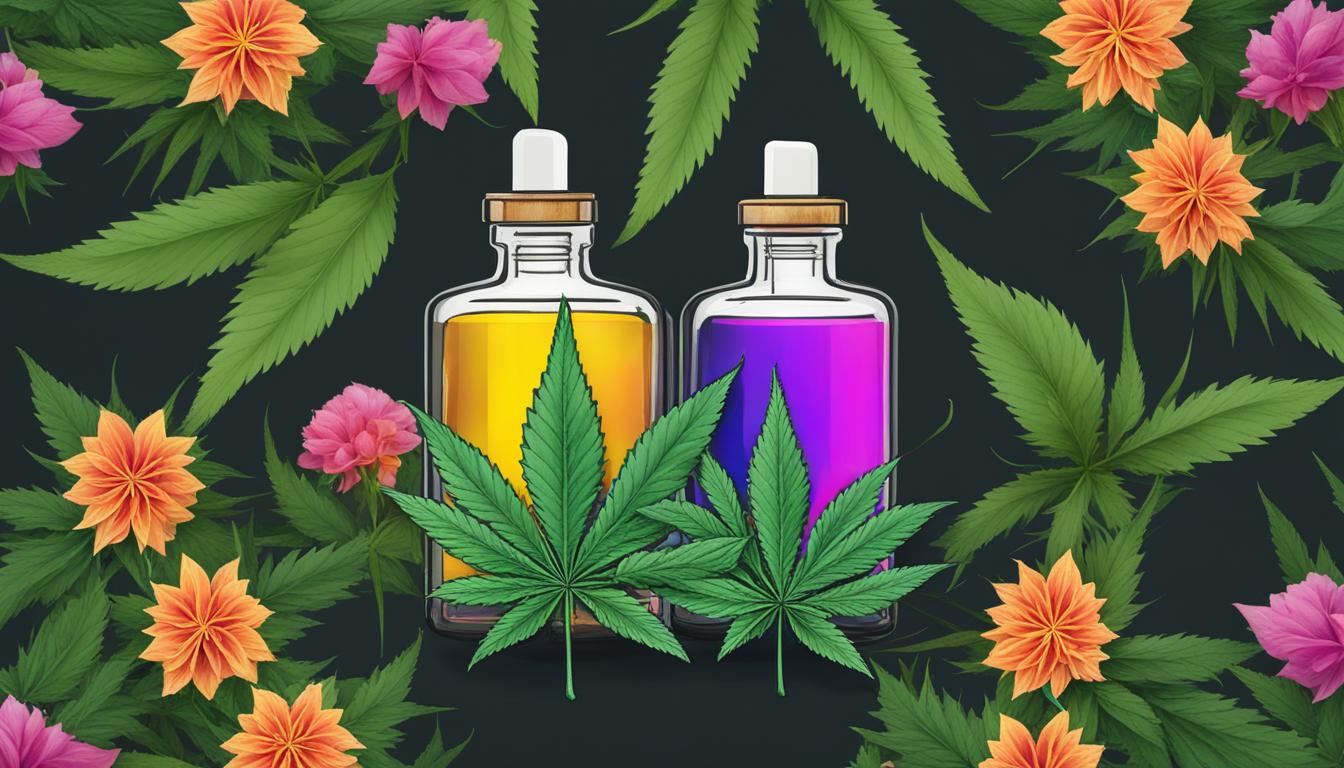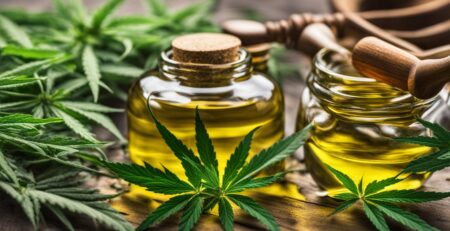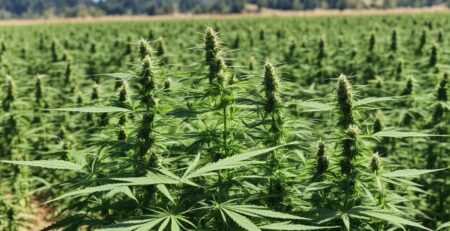Full Spectrum vs Broad Spectrum CBD: What’s the Difference?
When it comes to CBD products, you may have come across terms like “full spectrum” or “broad spectrum.” But what do these terms actually mean? In this article, we'll explore the differences between full spectrum and broad spectrum CBD, as well as CBD isolate, so you can make an informed decision when choosing the right CBD product for your needs.
Key Takeaways:
- Full spectrum CBD contains multiple naturally occurring plant compounds, including up to 0.3% THC.
- Broad spectrum CBD contains several cannabis plant compounds but is typically entirely free of THC.
- CBD isolate is the purest form of CBD, containing no other cannabis plant compounds.
- Understanding the differences between these types can help you choose the right CBD product for your needs.
The Benefits of Full Spectrum CBD
Full spectrum CBD products offer a wide range of benefits due to the synergistic interaction of various cannabinoids, terpenes, and other plant compounds. This phenomenon, known as the entourage effect, enhances the overall effectiveness of CBD in providing therapeutic effects.
One of the key advantages of full spectrum CBD is its potential for pain relief. The combination of cannabinoids and terpenes works together to provide analgesic properties, making it beneficial for managing chronic pain conditions such as arthritis or neuropathy.
Full spectrum CBD also exhibits powerful anti-inflammatory properties. The cannabinoids and terpenes present in these products work in harmony to reduce inflammation in the body, which can help alleviate symptoms of inflammatory conditions such as rheumatoid arthritis or inflammatory bowel disease.
Furthermore, full spectrum CBD has been found to have anxiolytic effects, making it a potential natural remedy for anxiety disorders. The interaction between CBD and other plant compounds can help promote a sense of calmness and relaxation, reducing feelings of anxiety and stress.
Additionally, full spectrum CBD has shown promise in improving sleep quality. The combination of cannabinoids and terpenes in these products can help regulate sleep patterns and promote a restful night's sleep. Individuals struggling with insomnia or sleep disturbances may find full spectrum CBD beneficial in improving their sleep.
It is important to note that the THC levels in full spectrum CBD are typically less than 0.3%, which is not potent enough to cause a euphoric effect in most people. However, individuals using full spectrum CBD products with higher levels of THC should be aware of the potential for euphoric effects.
Overall, full spectrum CBD offers a range of benefits due to the entourage effect, including pain relief, anti-inflammatory properties, anxiety relief, and improved sleep. It is a versatile option for individuals seeking holistic wellness and natural remedies.
Table: Comparison of Full Spectrum CBD Benefits
| Benefit | Description |
|---|---|
| Pain Relief | The combination of cannabinoids and terpenes provides analgesic properties, making it beneficial for managing chronic pain conditions. |
| Anti-inflammatory | Full spectrum CBD reduces inflammation in the body, alleviating symptoms of inflammatory conditions. |
| Anxiety Relief | The interaction between CBD and other plant compounds promotes a sense of calmness and relaxation, reducing anxiety and stress. |
| Sleep Aid | Full spectrum CBD helps regulate sleep patterns and promotes a restful night's sleep. |
Full spectrum CBD offers a range of benefits due to the entourage effect, including pain relief, anti-inflammatory properties, anxiety relief, and improved sleep.
The Advantages of Broad Spectrum CBD
Broad spectrum CBD offers several advantages for individuals seeking the potential benefits of CBD without any THC content. THC-free broad spectrum CBD products still contain a variety of other cannabinoids and terpenes, allowing for the entourage effect to enhance the effects of CBD. This means that the combination of these plant compounds can work together synergistically to provide a more comprehensive range of benefits.
One of the primary advantages of broad spectrum CBD is its ability to provide pain relief. Many individuals turn to CBD as a natural alternative to traditional pain medications. The cannabinoids and terpenes found in broad spectrum CBD can interact with the body's endocannabinoid system, which plays a crucial role in regulating pain perception. This interaction can help reduce pain and inflammation, making broad spectrum CBD a potential option for individuals suffering from chronic pain conditions.
“Broad spectrum CBD offers the potential benefits of CBD without any THC content, making it a suitable option for individuals who want to avoid the psychoactive effects of THC while still experiencing the potential benefits of other plant compounds.”
Another advantage of broad spectrum CBD is its potential to provide anxiety relief and aid in sleep. The cannabinoids and terpenes found in broad spectrum CBD have shown promising results in reducing anxiety and promoting relaxation. By interacting with receptors in the brain, broad spectrum CBD can help regulate mood and promote a sense of calm, making it an appealing option for individuals dealing with anxiety disorders or sleep disturbances.
The Entourage Effect and the Power of Terpenes
The entourage effect, which refers to the enhanced effects of CBD when combined with other plant compounds, is another advantage of broad spectrum CBD. Terpenes, the aromatic compounds found in cannabis and other plants, are believed to play a significant role in the entourage effect. Terpenes not only contribute to the unique flavors and aromas of different CBD strains but also offer their own potential therapeutic benefits. For example, the terpene limonene has been shown to have anti-anxiety and mood-elevating effects, while the terpene myrcene has potential muscle relaxant and sedative properties.
In summary, broad spectrum CBD provides a THC-free alternative for individuals seeking the potential benefits of CBD while avoiding the psychoactive effects of THC. It offers pain relief, anxiety relief, and potential sleep aid, making it a versatile option for various wellness needs. The entourage effect and the presence of beneficial terpenes further enhance the overall effects of broad spectrum CBD. When choosing a CBD product, consider your personal preferences and desired effects to find the best option for your individual needs.
| Advantages of Broad Spectrum CBD |
|---|
| Potential pain relief |
| Anxiety relief and sleep aid |
| THC-free |
| Potential for the entourage effect |
| Broad range of cannabinoids and terpenes |
Understanding CBD Isolate
CBD isolate is the purest form of CBD, containing only cannabidiol and no other plant compounds. During the cannabinoid extraction process, all other cannabinoids and terpenes are removed, leaving behind a crystalline powder that is almost 100% CBD. This ensures that CBD isolate is entirely free of THC, making it an excellent option for individuals who want to avoid THC entirely or for those who may have concerns about drug testing.
The high concentration of CBD in isolate form also means that it can be used in smaller doses compared to other CBD products. This can be advantageous for individuals who prefer a more potent CBD experience or for those who need higher CBD concentrations for specific therapeutic purposes. CBD isolate is commonly used for cooking or mixing with food and beverages, as it can easily be incorporated into various recipes. It can also be used to create DIY CBD products such as creams and balms.
“CBD isolate is the purest form of CBD, providing a THC-free option for individuals seeking the beneficial effects of CBD without any other plant compounds. Its versatility makes it suitable for various uses, from cooking to creating custom CBD products.”
Types of CBD Isolate
There are different types of CBD isolate available in the market, depending on the extraction method used and the overall purity of the final product. CBD isolate can be found in various forms, including:
- CBD Crystals: These are pure CBD isolate in the form of small crystals or powder, making them easy to measure and use. CBD crystals can be consumed orally, vaporized, or added to other products.
- CBD Powder: Similar to CBD crystals, CBD powder consists of finely ground CBD isolate. It can be used in a similar manner, added to food or beverages, or incorporated into CBD oil formulations.
- CBD Oil: Some manufacturers offer CBD isolate infused into a carrier oil, such as MCT oil or hemp seed oil. This makes it convenient for users who prefer the simplicity of using CBD oil.
When choosing CBD isolate, it's essential to consider the extraction method used and the manufacturer's credibility. Opting for a reputable brand that provides third-party lab testing ensures the quality and purity of the CBD isolate. This information should be easily accessible on the product's packaging or the manufacturer's website.
Table: Comparison of CBD Types
| CBD Isolate | Full Spectrum CBD | Broad Spectrum CBD | |
|---|---|---|---|
| Definition | Pure CBD, free of other plant compounds | Contains CBD and other cannabinoids, including THC (up to 0.3%) | Contains CBD and other cannabinoids, THC-free |
| Entourage Effect | Does not provide the entourage effect due to the absence of other plant compounds | Offers the potential benefits of the entourage effect | Offers the potential benefits of the entourage effect |
| THC Content | No THC content | Contains up to 0.3% THC | THC-free |
| Usage | Versatile for cooking, DIY creations, and precise dosing | Potential benefits of a variety of cannabinoids | Potential benefits of a variety of cannabinoids |
Note: The provided table offers a comparison of CBD isolate, full spectrum CBD, and broad spectrum CBD, highlighting their key differences.
Choosing the Right CBD Spectrum for Your Needs
When it comes to choosing the right CBD spectrum, several factors should be taken into consideration. Your personal preferences, THC tolerance, drug testing requirements, legal considerations, and desired effects all play a role in determining which CBD spectrum is best for you.
Firstly, personal preferences are important in selecting the right CBD spectrum. Some individuals may prefer to avoid any THC content altogether due to personal beliefs or concerns. In this case, broad spectrum CBD, which is THC-free but still contains other beneficial cannabinoids and terpenes, would be a suitable choice.
However, if you are comfortable with minimal levels of THC and want to experience the potential benefits of the entourage effect, full-spectrum CBD may be a better option for you. Full-spectrum CBD contains multiple plant compounds, including minimal levels of THC (less than 0.3%), which can enhance the overall effects of CBD.
It's also important to consider your THC tolerance and any drug testing requirements you may have. If you need to avoid THC completely due to drug testing or legal reasons, broad spectrum CBD is the safest choice. Broad spectrum CBD products are guaranteed to be THC-free, providing peace of mind and ensuring compliance with drug testing policies.
In conclusion, when choosing the right CBD spectrum, consider your personal preferences, THC tolerance, drug testing requirements, legal considerations, and desired effects. Broad spectrum CBD is a suitable choice for those who want to avoid THC, while full-spectrum CBD offers the potential benefits of the entourage effect. By understanding your needs and making an informed decision, you can find the perfect CBD spectrum for your individual requirements.
Extracting CBD: Methods and Considerations
Extracting CBD from the cannabis plant involves various methods, each with its own considerations and outcomes. The most commonly used extraction methods are carbon dioxide extraction, steam distillation, solvent extraction, and lipid extraction.
Carbon dioxide extraction: This method uses pressurized carbon dioxide to extract CBD from the hemp plant. It is considered one of the cleanest and most efficient methods, as it leaves behind no residual solvents and produces high-quality CBD oil.
Steam distillation: Steam is used to extract CBD oil and other compounds from the plant material. This method is effective in capturing the essential oils and smaller molecules, but it may not extract larger molecules, such as cannabinoids, as efficiently.
Solvent extraction: Solvents like ethanol or butane are used to separate CBD from the hemp plant. This method is cost-effective and efficient, but it can leave behind traces of the solvent in the final product, which may be a concern for some consumers.
Lipid extraction: This method involves soaking the hemp plant material in a lipid (usually oil or butter) to extract the cannabinoids. The resulting CBD-infused oil or butter can be used in cooking and baking. While lipid extraction is relatively simple, it may produce less concentrated CBD products compared to other methods.
After extraction, the resulting CBD oil can be classified as either full-spectrum or CBD isolate, depending on additional processing steps. Full-spectrum CBD undergoes a cooling and purification process to remove any impurities and convert it into a pure crystalline form. On the other hand, CBD isolate is the purest form of CBD, containing only cannabidiol without any other plant compounds.
“The extraction method used plays a crucial role in the final quality and composition of CBD products.”
Comparison of CBD Extraction Methods
| Extraction Method | Pros | Cons |
|---|---|---|
| Carbon dioxide extraction | High-quality CBD oil, no residual solvents | Expensive equipment, complex process |
| Steam distillation | Preserves essential oils, smaller molecules | May not extract larger molecules efficiently |
| Solvent extraction | Cost-effective, efficient | Potential residual solvent presence |
| Lipid extraction | Simple method, suitable for cooking | Less concentrated CBD products |
It is important to consider the extraction method used when choosing CBD products. Each method has its own advantages and drawbacks, which can impact the quality, purity, and effectiveness of the CBD oil. Consumers should look for products that are extracted using clean and efficient methods to ensure the highest quality CBD experience.
Understanding CBD Labels and Dosage
When using CBD products, it is essential to understand the information provided on the labels and follow the recommended dosage instructions. CBD labels play a crucial role in helping consumers make informed decisions about their CBD usage. They provide valuable information about the type of CBD (full-spectrum, broad-spectrum, or CBD isolate) and the concentration of CBD in the product. Let's take a closer look at what you need to know about CBD labels and dosage.
Label Information
CBD labels should clearly indicate whether the product contains full-spectrum CBD, broad-spectrum CBD, or CBD isolate. Full-spectrum CBD products contain all the naturally occurring plant compounds, including THC, while broad-spectrum products have the same compounds without the THC. CBD isolate products, as the name suggests, only contain pure CBD.
In addition to the CBD spectrum, labels should also display important information such as the CBD concentration per serving or per bottle. This concentration helps users understand the potency of the product and determine the appropriate dosage for their needs. It is important to note that CBD concentrations can vary between products, so it is crucial to read the labels carefully.
Dosage Instructions
Proper CBD usage involves following the manufacturer's dosage instructions. Each CBD product may have different recommended dosages, depending on factors such as concentration and desired effects. It is important to start with a low dosage and gradually increase if needed, as individual tolerance can vary.
The recommended dosage on the label is a general guideline, but it is always a good idea to consult with a healthcare professional if you have any questions or concerns. They can provide personalized advice based on your specific needs and help you determine the optimal dosage for your desired effects.
| Label Information | Dosage Instructions |
|---|---|
| CBD Spectrum | Follow manufacturer's recommendations |
| CBD Concentration | Start with a low dosage and adjust as needed |
| CBD Product Potency | Consult with a healthcare professional for personalized advice |
Understanding CBD labels and dosage instructions is crucial for using CBD products safely and effectively. By reading the labels carefully and following the recommended dosages, you can ensure that you are getting the most out of your CBD experience.

Potential Side Effects of CBD
While CBD is generally well-tolerated and considered safe, it is important to be aware of the potential side effects that may occur. It's worth noting that these side effects are typically minimal and temporary in nature. It is also important to emphasize that CBD affects individuals differently, and not everyone will experience these side effects.
One potential side effect of CBD is drowsiness. Some individuals may feel tired or sedated after taking CBD, especially if they are new to using it. It is recommended to start with a low dose and gradually increase as needed to minimize the risk of drowsiness.
Dry mouth is another possible side effect of CBD. CBD can temporarily reduce saliva production, leading to a dry sensation in the mouth. Staying hydrated by drinking water can help alleviate this symptom.
Some individuals may experience gastrointestinal issues such as diarrhea or nausea when taking CBD. These side effects are usually mild and resolve on their own. If they persist or worsen, it is advisable to discontinue use and consult with a healthcare professional.
Potential Drug Interactions
It is important to consider potential drug interactions when using CBD, as CBD can affect the metabolism of certain medications. CBD may inhibit the activity of enzymes responsible for metabolizing medications, potentially leading to higher levels of the medication in the bloodstream. This can increase the risk of adverse effects.
“It is crucial to consult with a healthcare professional if you are taking any medications, especially those with a narrow therapeutic range or known interactions with grapefruit juice, as they may have similar interactions with CBD.”
If you are currently taking medications, it is recommended to consult with your healthcare provider before incorporating CBD into your routine to ensure there are no potential drug interactions.
| Potential Side Effects of CBD | Prevalence |
|---|---|
| Drowsiness | Minimal |
| Dry Mouth | Minimal |
| Diarrhea | Minimal |
| Nausea | Minimal |
CBD is generally considered safe for most individuals, and the side effects are typically minimal and well-tolerated. However, it is essential to be aware of these potential side effects and monitor how CBD affects you personally. It is recommended to start with a low dosage and gradually increase as needed, under the guidance of a healthcare professional if necessary.
Choosing the Right CBD Product
When it comes to choosing a CBD product that suits your needs, there are several factors to consider. Whether you prefer full-spectrum, broad-spectrum, or CBD isolate products, understanding the differences and benefits can help you make an informed decision.
If you're looking for the combined effects of multiple plant compounds, including minimal levels of THC, full-spectrum CBD products may be the right choice for you. These products, such as CBD tinctures, gummies, and creams, harness the potential benefits of the entourage effect. However, it's important to note that the THC levels in full-spectrum CBD are usually less than 0.3% and are unlikely to cause a psychoactive effect.
For those who want to avoid THC entirely, broad-spectrum CBD products are a suitable option. These products, like CBD gummies and tinctures, contain other beneficial cannabinoids and terpenes without any THC content. You can still experience the entourage effect without the risk of THC-related effects.
If you prefer pure CBD without any other plant compounds, CBD isolate products are available. These products, such as CBD oils and creams, contain only pure CBD and are ideal for individuals who want to avoid THC or prefer a more concentrated form of CBD.

The Benefits of Full-Spectrum CBD
Improved Efficacy: The combination of multiple cannabinoids and terpenes in full-spectrum CBD products creates an entourage effect, enhancing the overall efficacy of CBD.
Potential Pain and Inflammation Relief: Full-spectrum CBD may provide pain relief and help reduce inflammation due to the presence of various plant compounds.
Possible Anxiety Relief: Some individuals find that full-spectrum CBD helps alleviate anxiety symptoms, potentially due to the interaction between different cannabinoids and terpenes.
The Advantages of Broad-Spectrum CBD
No THC Content: Broad-spectrum CBD products are completely free of THC while still containing other beneficial cannabinoids and terpenes.
Similar Benefits to Full Spectrum: Broad-spectrum CBD can offer similar benefits to full-spectrum CBD, including potential pain relief, anxiety relief, and improved sleep.
Legal Considerations: Broad-spectrum CBD is a suitable choice for individuals who may have strict THC restrictions due to legal or employment considerations.
Understanding CBD Isolate
Pure CBD: CBD isolate is the purest form of CBD available, containing only cannabidiol without any other plant compounds.
No THC: CBD isolate products are completely THC-free, making them a preferred choice for individuals who want to avoid THC entirely.
High Concentration: CBD isolate is highly concentrated, making it suitable for individuals who prefer higher doses of CBD.
| Full-Spectrum CBD | Broad-Spectrum CBD | CBD Isolate | |
|---|---|---|---|
| THC Content | Up to 0.3% THC | No THC | No THC |
| Other Cannabinoids | Multiple cannabinoids present | Multiple cannabinoids present | No other cannabinoids |
| Terpenes | Various terpenes present | Various terpenes present | No terpenes |
| Potential Benefits | Pain relief, anti-inflammatory, anxiety relief, sleep aid, entourage effect | Pain relief, anxiety relief, sleep aid, entourage effect | Pure CBD, high concentration |
CBD for Canine Anxiety and Stress Relief
Many pet owners are turning to CBD oil as a natural remedy for canine anxiety and stress. CBD, or cannabidiol, is a non-psychoactive compound derived from the hemp plant. It has been found to have calming effects on dogs and can help manage their anxiety without the potential side effects of traditional medications.
Canine anxiety can manifest in various ways, including excessive barking, destructive behavior, restlessness, and even aggression. CBD oil's calming properties can help relax anxious dogs and promote a sense of relaxation. It works by interacting with the endocannabinoid system in the body, which plays a role in regulating emotions and mood.
Research suggests that CBD oil can benefit dogs with anxiety and stress. It has been found to reduce anxiety-related behaviors and improve overall well-being. However, it is important to note that CBD oil is not a cure-all solution and should be used as part of a comprehensive stress management plan for your dog. Consulting with a veterinarian is crucial to determine the appropriate dosage and to ensure the safety and well-being of your pet.
| Benefits of CBD oil for canine anxiety: |
|---|
| Calming effects |
| Reduces anxiety-related behaviors |
| Promotes a sense of relaxation |
| Non-psychoactive |
| Natural remedy without potential side effects |
When using CBD oil for your dog, it is important to choose a high-quality product specifically formulated for pets. Look for CBD oils that are third-party tested for purity and potency. Start with a low dosage and gradually increase if needed, monitoring your dog's response and consulting with your veterinarian along the way.
Key Takeaways:
- CBD oil can provide a natural remedy for canine anxiety and stress without the potential side effects of traditional medications.
- CBD oil's calming properties can help relax anxious dogs and promote a sense of relaxation.
- Research suggests that CBD oil can reduce anxiety-related behaviors and improve overall well-being in dogs.
- Consulting with a veterinarian is important to determine the appropriate dosage and ensure the safety and well-being of your pet.
- Choose a high-quality CBD oil specifically formulated for pets and start with a low dosage, gradually increasing if needed.
Conclusion
Choosing the right CBD product is crucial for experiencing the benefits of CBD. Understanding the differences between full spectrum and broad spectrum CBD can help guide your decision. Full-spectrum CBD contains multiple plant compounds, including trace amounts of THC, which offers the potential benefits of the entourage effect. On the other hand, broad-spectrum CBD is THC-free but still contains other beneficial cannabinoids and terpenes.
Consider your personal preferences, desired effects, and any legal or drug testing considerations when selecting a CBD product. Take into account your THC tolerance and whether you want to avoid THC entirely. Also, think about the specific benefits you are seeking, as different CBD spectrums may provide varying effects.
When it comes to product selection, full spectrum CBD is available in various forms like tinctures, gummies, and creams. Broad-spectrum CBD products, such as gummies and tinctures, are THC-free but still contain other beneficial compounds. CBD isolate products, like tinctures and creams, offer pure CBD without any other plant compounds. Choose a product that aligns with your needs and preferences.
Remember to follow the recommended dosage instructions provided by the manufacturer and consult with a healthcare professional if needed. By making an informed choice, you can optimize the benefits of CBD and find the product that suits you best.
FAQ
What is the difference between full spectrum and broad spectrum CBD?
Full-spectrum CBD products contain multiple naturally occurring plant compounds, including up to 0.3% THC. Broad-spectrum CBD products contain several cannabis plant compounds but are typically entirely free of THC. CBD isolate is the purest form of CBD, containing no other cannabis plant compounds.
What are the benefits of full spectrum CBD?
Full spectrum CBD offers the benefits of the “entourage effect,” where the combination of cannabinoids, terpenes, and other plant compounds work together to enhance the overall effects of CBD. It can provide pain relief, anti-inflammatory properties, anxiety relief, and aid in sleep. However, it may contain low levels of THC, which can cause euphoric effects in some individuals.
What are the advantages of broad spectrum CBD?
Broad spectrum CBD offers similar benefits to full-spectrum CBD without any THC content. It still contains multiple cannabinoids and terpenes, allowing for the entourage effect to enhance the effects of CBD. Broad spectrum CBD can provide pain relief, anxiety relief, and aid in sleep. It is a suitable option for individuals who want to avoid THC but still want the potential benefits of other plant compounds found in CBD products.
What is CBD isolate?
CBD isolate is the purest form of CBD, containing only cannabidiol and no other plant compounds. It is ideal for individuals who want to avoid THC entirely or prefer a more concentrated form of CBD. CBD isolate lacks the potential benefits of the entourage effect since it does not contain any other plant compounds typically found in full-spectrum or broad-spectrum CBD.
How do I choose the right CBD spectrum for my needs?
When choosing the right CBD spectrum, it is essential to consider your personal preferences, THC tolerance, drug testing requirements, legal considerations, and desired effects. If you do not want any THC content or have strict drug testing policies, broad spectrum CBD is a suitable choice. If you are comfortable with minimal THC levels and want to experience the potential benefits of the entourage effect, full-spectrum CBD may be the better option. CBD isolate is ideal for individuals who want pure CBD without any other plant compounds or THC.
What are the methods used to extract CBD?
CBD is extracted from the cannabis plant using various methods, including carbon dioxide extraction, steam distillation, solvent extraction, and lipid extraction. These methods vary in effectiveness, and certain methods can leave behind solvent residue or affect the flavor of the extract.
How do I understand CBD labels and dosage?
When using CBD, it is important to understand the labels and dosage instructions provided by the manufacturer. CBD labels should clearly indicate the type of CBD and provide the recommended dosage. It is important to follow the manufacturer's dosage instructions carefully and consult with a healthcare professional if you have any questions or experience any side effects.
What are the potential side effects of CBD?
CBD is generally well-tolerated, and most individuals experience minimal side effects. However, some potential side effects include drowsiness, dry mouth, diarrhea, and nausea. It is important to start with a low dosage and gradually increase if needed to minimize the risk of side effects. CBD may also interact with certain medications, so it is advisable to consult with a healthcare professional if you are taking any medications.
How do I choose the right CBD product?
When choosing a CBD product, consider your preferred method of consumption and the specific benefits you are seeking. Full-spectrum CBD products include tinctures, gummies, and creams, which contain multiple plant compounds and may have trace amounts of THC. Broad-spectrum CBD products, such as gummies and tinctures, are THC-free but still contain other beneficial cannabinoids and terpenes. CBD isolate products, such as tinctures and creams, contain only pure CBD. Choose a product that aligns with your needs and preferences.
Can CBD oil help with canine anxiety and stress relief?
Yes, CBD oil has been found to be beneficial for canine anxiety and stress relief. It can provide a natural remedy for dog anxiety and stress without the potential side effects of traditional medications. CBD oil can help calm anxious dogs and promote a sense of relaxation. It is important to choose high-quality CBD oil specifically formulated for pets and follow the recommended dosage instructions. Always consult with a veterinarian before giving CBD oil to your dog.
Source Links
- https://www.healthline.com/health/full-spectrum-vs-broad-spectrum-cbd
- https://www.medicalnewstoday.com/articles/full-spectrum-cbd-vs-broad-spectrum-cbd











Leave a Reply